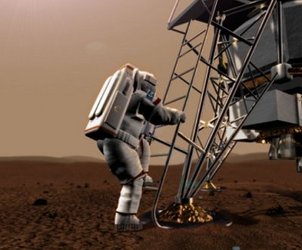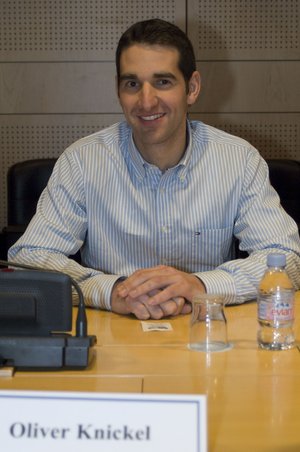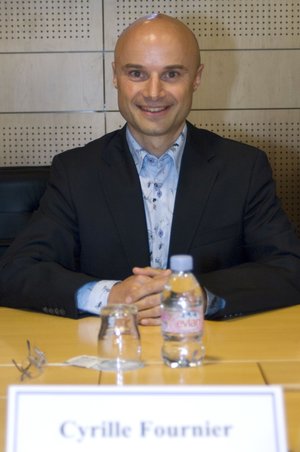Mars500 diary: trial run
As the start of their 105-day stay in the special isolation facility nears, the six Mars500 crewmembers participated in a short trial run. The ESA-selected participants Oliver Knickel and Cyrille Fournier sent a diary entry before they embark on the simulated Mars mission tomorrow afternoon.
Cyrille Fournier writes:
After almost two months of training at Star City and the IBMP institute, we are finally getting close to what we have been aiming for since mid-2007!
However, before going in the module for the 105-day isolation, we went through a four-day dry run. This was for us to get used to the facility and check if we hadn't forgotten anything obvious for the scientific experiment, or any of the personal items we are planning to take with us.
On Thursday 26 March, at 10 o'clock, Serguei Ryazansky, Oleg Artemev, Alexei Baranov, Alexei Shpakov, Oliver Knickel and I stepped into the module as we will be doing on 31 March. This time it was only for four days, but it gave us a taste of how we will live for 105 days.
Ironically, we all felt quite relieved as the previous days were very hectic in terms of involvement in the medical analyses, experiment checks and media participation.

I immediately felt at ease in this limited space as it is very well organised and quite comfortable. The Russians have already performed two 15-day isolation studies last year and obviously they were more familiar with the place than we were.
We started our stay by organising all the equipment that was brought in by the scientific teams. Then we went through different experiments, helping each other to put on electrodes or sensors. With the food being an experiment by itself, we spent a lot of time checking the tonnes of food that is stored in the freezers and on trying to settle on ways of heating up all our meals as fast as possible!
We also had discussions with an Austrian team who was installing a body training machine that is part of a study about keeping fit through different physical training programmes.
We also tried an ESA experiment proposed by a Dutch team which requires the participation of three crewmembers. Through a computer-supported exchange 'game' they will analyse how we each behave within a small group. We will obviously have to regularly perform these experiments through the entire isolation period, the point being to record, for each of us, the evolution of social parameters.
Also, as bedtime was closing in, two of us had to spend the night wearing a 128-electrode cap to record our brain activity whilst we slept. As well as the cap there was also a three-electrode ECG recording device and a sensor in the nose for measuring the breathing activity. This Italian experiment studies a particular brain wave produced during the first four hours of sleep.

Alexei Baranov and I were the first two lucky ones to try the entire system. Although it was, as one can expect, very uncomfortable to sleep with, we were definitely tired enough to fall asleep very quickly. However, we woke up quite frequently, not just because of the cap but mainly because of being literally entangled in the cables!
The next days were dedicated to upgrading comfort inside our module, while keeping up with the experiments and the collection of fluids (saliva, urine, blood) necessary for a number of scientists who will be looking at changes in our hormone levels and other physiological parameters. Every night, two other crewmembers were subjects for the Italian brain wave experiment.
The dry run gave me a brief, but I believe accurate, glimpse of what we will go through the next 105 days. On a personal level, I felt very comfortable in the module and quickly became familiar with this new environment. As a group, I have to say the crew is truly great and that all individuals, in addition to intellectual qualities and psychological balance, have real communication, social and behavioural skills that will not only be appreciated by the other crewmembers, but also needed in case tensions arise because of whatever reason(s). I have sincere and grounded hopes that we will manage to live together in isolation rather well. Obviously, we will see by mid-July!
Meanwhile, we have less than two days left to get fully ready to start the isolation. This will definitely focus only on the material preparation, as we, the six crewmembers including Oliver and me, are 200% psychologically ready to enter the module on 31 March 31!

Oliver Knickel writes:
From 26 to 29 March, we participated in a dry run inside the Mars500 facility. We went through all the experiments one last time that we will have to complete during isolation and made sure that all the items we need are in place.
We also had the first opportunity to familiarise ourselves with the facility itself and its technical procedures. We installed our greenhouse with our first onions and had our first physical training with the different devices in our exercise room.
I was, of course, especially excited about sleeping for the first time in my 3 m2 room, while wearing an EEG cap to measure my sleep behaviour. But even I was surprised about how deeply I slept, not waking up because of the EEG cap or because of sleeping in a 40cm x 185cm bed.
During the dry run we had a very good time with our Russian crewmates, supporting them during the Russian experiments, while they did a great job of helping us with our European experiments.
We were all very happy about the quality of the food, which mainly consists of Bavarian dishes that we tried for the first time. Now we are even looking forward to trying more of this food during isolation.
We finally took the chance to go through all the medical procedures and provide the final data for the Baseline Data Collection which will enable the scientist to compare the data gathered during isolation with the data provided before.
At the end of the dry run we were all in good spirits about the progress we had made and about the good technical shape of the facility. All crewmembers are now very eager to start and are looking forward to prove their well-trained abilities during the isolation period.















 Germany
Germany
 Austria
Austria
 Belgium
Belgium
 Denmark
Denmark
 Spain
Spain
 Estonia
Estonia
 Finland
Finland
 France
France
 Greece
Greece
 Hungary
Hungary
 Ireland
Ireland
 Italy
Italy
 Luxembourg
Luxembourg
 Norway
Norway
 The Netherlands
The Netherlands
 Poland
Poland
 Portugal
Portugal
 Czechia
Czechia
 Romania
Romania
 United Kingdom
United Kingdom
 Slovenia
Slovenia
 Sweden
Sweden
 Switzerland
Switzerland































